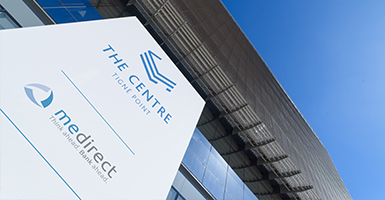Franklin Templeton’s Notes from the Trading Desk offers a weekly overview of what their professional traders and analysts are watching in the markets. The European desk is manned by eight professionals based in Edinburgh, Scotland, with an average of 15 years of experience whose job it is to monitor the markets around the world. Their views are theirs alone and are not intended to be construed as investment advice.
The Digest
Despite a late selloff on Friday, global equities traded higher overall last week. Markets in the Asia Pacific (APAC) region closed the week up 1.8%, the STOXX Europe 600 Index closed up 1.3%, whilst the S&P 500 Index closed up 0.6%. There was a fairly evident rotation into some of the more beaten-up sectors as we saw a global theme of year-to-date losers performing better last week and European value outperforming growth.
UK Gross Domestic Product (GDP) Drops
Data continues to be a key focus for markets as countries generally continue to emerge from lockdowns. However, the main headline in Europe came out of the United Kingdom after the country registered its largest quarterly GDP drop on record in the second quarter (Q2), falling 20.4%.
The hit to GDP was largely expected, and officially means that the UK economy is now in a recession following a 2.2% drop in the first quarter. Private consumption was considered the main driver, falling 23.1% through the quarter. UK equities largely underperformed equities globally last week, with the FTSE 100 Index up just 1% and the FTSE 250 Index up just 0.6%, but that is from a relatively low base; UK equities have generally underperformed this year.
Data suggests that April and May were the low points for the UK economy, with GDP rebounding 8.7% in June. Unemployment remained the same in June, whilst industrial production grew faster than expected. Although a rebound is expected through the third quarter, the strength of that optimism would be tapered should there be a second spike in COVID-19 cases in the country.
From data already released, the United Kingdom was the worst-hit economy in Europe in the second quarter. This becomes clearer when we compare the equivalent data across the eurozone. Data released on Friday suggests eurozone GDP fell -12.1%, which was largely in line with expectations. GDP in France dropped 13.8% in the second quarter.
Berenberg Bank has predicted that the eurozone will return to pre-COVID-19 levels of GDP by the third quarter of 2022.
The Citi Economic Surprise Index hit new all-time highs again last week; however, there is concern that this will begin to level out as some recent data has missed expectations. The German ZEW survey was one key data disappointment, coming in at -81.3. In China, data on new loans, industrial production and retail sales for July all missed expectations. In the United States, it was a similar story. Later this week the focus will be on the global manufacturing data on Friday.
COVID-19: Beware Rising Cases in Europe
As the summer started and lockdowns eased across Europe, there was a “feel-good” factor that helped consumer activity start to rebound nicely in a number of countries, and equity markets likewise saw recovery.
However, concerns seem to be rising over the increase in new COVID-19 case numbers across the continent. Spain is now registering over 3,000 new cases a day, and notably both France and Germany are also seeing numbers increasing.
Towards the end of last week, the UK government announced it had added France and the Netherlands to its list of quarantine countries (which means that visitors returning from these destinations have to quarantine for 14 days). Unsurprisingly, the travel & leisure sector closed down 2.3% on Friday, the worst-performing sector on the day. France has already threatened retaliatory measures. Over the next month it will be crucial to see if new cases can be controlled and to determine what the impact to consumer confidence will be, as well as the knock-on effect on market sentiment.
Whilst the number of increased cases may be attributed in some part to better testing, we also need to be monitoring the mortality rate, as it differs amongst countries. However, as we progress into colder months, we could see populations at greater risk and governments back under pressure to re-impose more restrictions.
Latin America is also an area of key focus with regards to coronavirus cases. The region is currently accounting for half of all COVID-19 deaths worldwide. From an economic perspective, whilst the United States and countries around Europe and Asia have been able to inject unprecedented levels of stimulus into their economies, countries in Latin America do not have the same financial resources to do the same. Policies to contain the virus are costly, and could plunge the region into a deep economic crisis.
Finally, the number of active cases in the United States continues to rise, with new daily cases hovering around the 50,000 mark.
Week in Review
Europe
European equities traded higher amid a generally quiet week despite a late selloff on Friday.
As noted, value outperformed momentum last week, with and this some of the year-to-date losers including banks, oil & gas and travel & leisure amongst the outperformers. Automobile stocks were also notably strong. The year-to-date outperformers were among the week’s laggards, with health care and technology both down. Real estate also lagged as investors made moves out of more defensive stocks.
We are in the midst of peak holiday season in Europe, so newsflow and market volumes are light at this time of year. Even amidst earnings season, European markets were very quiet in July, with volumes the lowest since 2013 for the time of year.
August also started quietly in terms of market volumes. In times like this, market moves can be exacerbated on very little newsflow, so they have to be taken with a pinch of salt. Volumes were poor last week, with weekly totals at their lowest levels since late January. Whilst many market participants are on late summer breaks, the impression we get is that many fund managers are now in “wait-and-see” mode, with many questioning how sustainable the extent of the bounce from the lows actually is.
United States
US markets were higher across the board last week, with the S&P 500 Index breaking above its highest-ever closing level on Thursday, albeit on low volumes as we have seen in Europe. The NASDAQ Index underperformed, but it had seen a huge run, up almost 60% from the March lows. Looking at sectors, the picture was again similar to Europe, with the defensive real estate investment trusts (REITs) and utilities underperforming, whilst value interest helped the industrials come out on top. The worrying rise in COVID-19 cases is beginning to moderate slightly, with the incidence of death in known cases falling below 2%. US equities have now clawed back 99% of the losses suffered since their pre-pandemic high, with European indices lagging. As we have discussed previously, the domineering US technology companies have been responsible for much of this recovery.
July US inflation data came in better than expected, with the core consumer price index (CPI) up +1.6%, the strongest monthly increase since 1991. The data helped to lift bond yields from their lows (the US 10-year Treasury rallied 14.5 basis points last week). The core figure was boosted by a positive reversal in areas such as transportation, automobile insurance and airline fares as lockdown restrictions eased. We expect to see more modest readings likely going forward.
US Congress remains at an impasse regarding the government’s latest stimulus package, but temporary measures are now in place. President Donald Trump authorised all US states to pay US$400 per week in additional unemployment benefits, suspended payroll tax collection and extended the federal eviction moratorium. This has abated near-term concerns about individuals left without support, but there still may be more relief coming. There are also questions over just how effective these measures are, with the payroll deferral “voluntary” and really amounting to a zero-interest bridge loan at best.
Last week saw Argentina’s Economy Minister Martin Guzman reach a breakthrough agreement with its largest bondholder group to restructure US$65 billion of foreign debt, allowing the country to move forward from its sovereign debt default. A deadlock has persisted since May, when the country saw its ninth default since Argentina became independent in 1816. There had been panic over the prospect of the government pausing talks with bondholders and instead trying to thrash out a deal with its largest creditor, International Monetary Fund (IMF). So, this development is welcome news to all parties, despite all having to give back some ground. A formal vote is still required, with the deadline being 24 August.
APAC
Equities in the APAC region were mostly higher, with Japan the clear outperformer on the week. Chinese equities made small gains, with mixed macro data from the country. Retail sales in China slumped in July for the seventh month in a row, with households appearing to remain reluctant to spend. This will clearly also be a concern for economies elsewhere that are reopening later than China.
China’s economic rebound is clearly uneven, with other data looking more promising; industrial output rose 4.8% year-on-year in July, with local governments helping to support the space through infrastructure spending. The rebound in industrial production has been particularly impressive versus the rest of the world. Car sales were also a bright spot within the larger retail sales release, up 12% year-on-year in July, which helped automobile stocks to outperform globally last week.
As noted, US equities have now recovered around 99% of their losses looking at pre-pandemic highs versus March lows, and China and South Korea have fared even better. With their relatively heavy shift towards technology, the Shanghai Composite Index and the KOSPI have now recovered all of their losses (in local currency). Japan’s equity market is lagging somewhat, at just less than 80% of those losses recovered.
Week Ahead
The United Kingdom will be in focus as Brexit talks resuming this week.
We also have Global Flash Purchasing Managers’ Index reports (PMIs) for August coming out Friday.
Perhaps most concerning in the July PMIs was the more modest move up in the employment PMI to a level that is still below 50, thus still in contraction. With fiscal supports now fading, labour market healing is a necessary condition for the recovery to continue. Although the employment PMI did not fall nearly as much as indicated by the slump in global hiring, hopes for a quicker bounce-back than the painfully sluggish recovery from the global financial crisis likely needs to see the global employment PMI move above 50 at some point this quarter.
Calendar
Market holidays: None of note.
Monday 17 August
• Economic/Political:
• Data: US: (August) Empire Manufacturing; UK: (August) Rightmove house prices; Japan: (Q2) GDP (report shows a contraction of 27.8% on the quarter)
Tuesday 18 August
• Economic/Political: Brexit talks
• Data: US: building permits; housing starts
Wednesday 19 August
• Economic/Political: FOMC meeting minutes; European Central Bank (ECB) Current Account
• Data: UK: (July) CPI; Japan: (June) core machine orders; (July) trade balance
Thursday 20 August
• Economic/Political: Norges Bank rate announcement: no change; Central Bank of the Republic of Turkey (CBRT) rate announcement: no change; ECB July monetary policy meeting account; Riksbank’s Deputy Governor Cecilla Skingsley speaks
• Data: US initial jobless claims
Friday 21 August
• Economic/Political: France sovereign debt to be rated by Moody’s
• Data: Global (August) flash PMIs: US: Markit manufacturing & services, Japan: Markit manufacturing & services, France: Markit manufacturing & services, Germany: Markit manufacturing & services, eurozone: Markit manufacturing & services, UK: Markit manufacturing & services; eurozone: (August, advance) consumer confidence; UK: (August, Preliminary) Gfk consumer confidence, (July) retail sales.
Franklin Templeton Key risks & Disclaimers:
What Are the Risks?
All investments involve risk, including possible loss of principal. The value of investments can go down as well as up, and investors may not get back the full amount invested. Stock prices fluctuate, sometimes rapidly and dramatically, due to factors affecting individual companies, particular industries or sectors, or general market conditions. Bond prices generally move in the opposite direction of interest rates. Thus, as prices of bonds in an investment portfolio adjust to a rise in interest rates, the value of the portfolio may decline. Investments in foreign securities involve special risks including currency fluctuations, economic instability and political developments. Investments in developing markets involve heightened risks related to the same factors, in addition to those associated with their relatively small size and lesser liquidity. Past performance is not an indicator or guarantee of future performance.
This article reflects the analysis and opinions of Franklin Templeton’s European Trading Desk as of 17th August 2020, and may vary from the analysis and opinions of other investment teams, platforms, portfolio managers or strategies at Franklin Templeton. Because market and economic conditions are often subject to rapid change, the analysis and opinions provided may change without notice. An assessment of a particular country, market, region, security, investment or strategy is not intended as an investment recommendation, nor does it constitute investment advice. Statements of fact are from sources considered reliable, but no representation or warranty is made as to their completeness or accuracy. This article does not provide a complete analysis of every material fact regarding any country, region, market, industry or security. Nothing in this document may be relied upon as investment advice or an investment recommendation. The companies named herein are used solely for illustrative purposes; any investment may or may not be currently held by any portfolio advised by Franklin Templeton. Data from third-party sources may have been used in the preparation of this material and Franklin Templeton (“FT”) has not independently verified, validated or audited such data. FT accepts no liability whatsoever for any loss arising from use of this information and reliance upon the comments, opinions and analyses in the material is at the sole discretion of the user. Products, services and information may not be available in all jurisdictions and are offered by FT affiliates and/or their distributors as local laws and regulations permit. Please consult your own professional adviser for further information on availability of products and services in your jurisdiction.
Issued by Franklin Templeton Investment Management Limited (FTIML) Registered office: Cannon Place, 78 Cannon Street, London EC4N 6HL. FTIML is authorised and regulated by the Financial Conduct Authority.
MeDirect Disclaimers:
This information has been accurately reproduced, as received from Franklin Templeton Investment Management Limited (FTIML). No information has been omitted which would render the reproduced information inaccurate or misleading. This information is being distributed by MeDirect Bank (Malta) plc to its customers. The information contained in this document is for general information purposes only and is not intended to provide legal or other professional advice nor does it commit MeDirect Bank (Malta) plc to any obligation whatsoever. The information available in this document is not intended to be a suggestion, recommendation or solicitation to buy, hold or sell, any securities and is not guaranteed as to accuracy or completeness.
The financial instruments discussed in the document may not be suitable for all investors and investors must make their own informed decisions and seek their own advice regarding the appropriateness of investing in financial instruments or implementing strategies discussed herein.
If you invest in this product you may lose some or all of the money you invest. The value of your investment may go down as well as up. A commission or sales fee may be charged at the time of the initial purchase for an investment and may be deducted from the invested amount therefore lowering the size of your investment. Any income you get from this investment may go down as well as up. This product may be affected by changes in currency exchange rate movements thereby affecting your investment return therefrom. The performance figures quoted refer to the past and past performance is not a guarantee of future performance or a reliable guide to future performance. Any decision to invest in a mutual fund should always be based upon the details contained in the Prospectus and Key Investor Information Document (KIID), which may be obtained from MeDirect Bank (Malta) plc.



